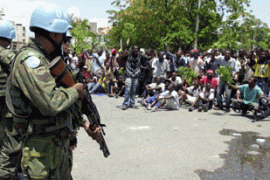Brown urges action on food prices
World Bank warns high prices are likely to remain until 2015 for most crops.

Among the actions Brown requested was a redoubling of efforts to reach a Doha global trade deal, help to improve the agricultural output of developing countries, boosting support for farm research, and examining the impact of different biofuels methods.
| Your Views |
The prime minister also called for World Bank and IMF financial support for countries facing balance of payments difficulties because of the price hikes.
He said that market-based risk management instruments, including derivatives, could also be considered to avert food price volatility.
In addition, urgent action was needed to explore the impact of climate change on the livelihoods of the poor, he said.
A combination of rising fuel costs, more demand for food in increasingly prosperous parts of Asia, the use of farmland and crops for biofuels, bad weather and speculation on futures markets have all pushed up food prices.
The increase has prompted violent protests in a handful of countries.
In the latest rioting, at least five people were killed in a week of demonstrations in Haiti over the rising costs of food, while unions in Burkina Faso, in west Africa, called a general strike over the high cost of living.
Long-term problem
Brown’s letter follows World Bank comments on Wednesday that rising global food costs are not a temporary phenomenon and prices are likely to stay above 2004 levels until 2015 for most crops.
In a policy paper prepared for this weekend’s IMF and World Bank meetings in Washington, the bank said that food prices were set to stay high in 2008 and 2009, and then decline as supply and demand responds to high prices.
Robert Zoellick, the bank’s president, said he feared the higher food prices would reverse declining poverty levels in some countries.
Last week, Zoellick also called for a global response to tackle the food crisis.
“As an international community we must rally not only to offer immediate support, but to help countries identify actions and policies to reduce the impact on the world’s most vulnerable,” he said on Wednesday.
The bank suggested that the least disruptive policy response to dealing with higher prices was for countries to introduce or expand cash transfer programmes to the poor.
“These support the purchasing power of the poor without distorting domestic incentives to produce more food, and without reducing the incomes of poor food sellers,” it said.
To tackle domestic food insecurity, it also said countries should cut tariffs and taxes on key staple foods.
The bank said there had been a sharp surge in domestic food price inflation especially in Sri Lanka (34 per cent), Costa Rica (21 per cent) and Egypt (13.5 per cent).